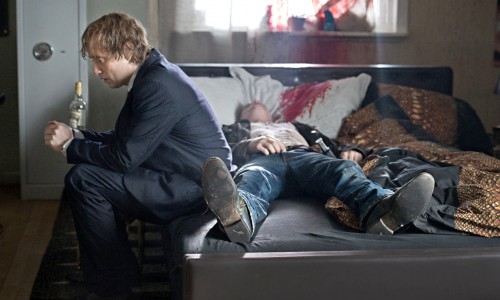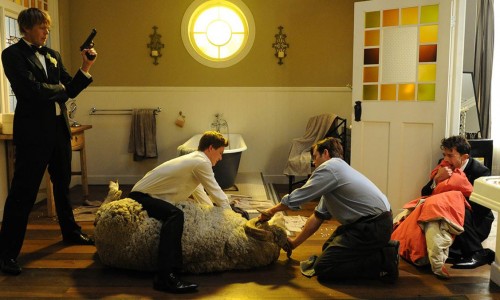
It’s at this time of year that professional bodies and publications churn out their best-of lists, and so it is that we can also present its best and worst of 2012, which puts us one up on most, as you don’t see BAFTA giving out prizes for the embarrassment that shouldn’t have made it to the big screen.
As with last year, the statistics seem to paint the kind of picture you might expect, with no films being either perfect or unremittingly awful and the vast majority hovering somewhere in the 2.5 stars to 3.5 stars bracket. But there were undoubtedly a good number of releases that stood out from the crowd, for their exemplary brilliance or for the lessons they can teach future film-makers about what to avoid.
FOUR AND A HALF STARS
In no particular order, our best of the year were four films which each earned a 4.5 star rating. Three of them are foreign language films, one of which is already being treated to an English-language remake.
AMOUR – Michael Haneke’s Cannes Palme d’Or winning tale of the love of an elderly couple torn apart by a degenerative illness. An unusually and unexpectedly warm-hearted film from Haneke, with a title that was, surprisingly, in no way ironic.
THE HUNT – Thomas Vinterberg was back on top form for the first time since Festen, with a powerful exploration of the devastating effect false accusations can have on the reputation and life of a respected member of a community. Mads Mikkelson deservedly won the Best Actor award at Cannes and don’t be surprised if he features on some more awards lists, even if it seems that the film itself has been forgotten by most awards bodies, since the London Film Festival.
HEADHUNTERS – One of the most commercially accessible foreign language films of recent years, Morten Tyldum’s thriller is an astonishingly exciting thriller, so effective in its manipulation of the audience as to forgive it its few narrative weaknesses. A perfect example of how most critics and industry bodies prefer to throw awards at art over entertainment, in that it’s been largely overlooked outside its native Norway. But it’s surely only a matter of time before Tyldum follows fellow Scandinavian director Tomas Alfredson into English-language films.
ARGO – Ben Affleck’s latest foray into directing marks him as a man who can handle comedy – or at least satire – and tension with equal skill. His retelling of the CIA’s rescue of American embassy workers from Tehran has rightly been recognised by critics, industry bodies and film-goers as it successfully adds an arthouse sensibility to a highly effective piece of mainstream entertainment. Look out for this one come Oscars night.
FOUR STARS
Starting with films that found themselves on last year’s awards lists and including a handful of the best British films of the year, this list highlights some of the film-making talent to look out for in the years ahead, including actor-turned-first-time-director Dexter Fletcher and the ever-rising Ben Wheatley.
MARGIN CALL – A riveting examination of the kind of backroom dealing that caused the financial crisis, blessed with powerful performances from Kevin Spacey, Jeremy Irons, Stanley Tucci and Zachary Quinto, who loved JC Chandor’s debut script so much, he produced it.
CARNAGE – Roman Polanski’s chamber piece, set entirely in one room, as two sets of parents argue over a playground tussle between their sons. A visceral examination of social differences in the New York suburbs – filmed, of course, about as far from New York as Polanski could get.
WILD BILL – British film is often condemned for spending too much time in the small-time underworld, a problem it’s been unable to shake off since Guy Ritchie burst onto the scene with Lock Stock and Two Smoking Barrels. But here, one of the stars of that film, Dexter Fletcher, takes over the reigns to give us an original take on the former convict trying to clean up his act, thanks to outstanding turns from Charlie Creed-Miles and his screen sons, Will Poulter and Sammy Williams.
MOONRISE KINGDOM – Typically quirky and undeniably arch, Wes Anderson’s critic-friendly tale of childhood love was a colourful bonanza of entertainment, with one of the most enjoyable cameos of the year, in the shape of Bruce Willis.
TED – The biggest commercial success and the most mainstream film on our best of the year list, Seth MacFarlane’s feature debut brings together the rarely seen comedic talents of Mark Wahlberg with his own foul-mouthed grown-up teddy bear.
ANNA KARENINA – Joe Wright’s theatrical telling of Tolstoy’s Anna Karenina is a visual feast, and not just because of Keira Knightley and her array of splendid gowns. A tight budget forced Wright to work within the constraints of a theatre-like set, which he turned to his creative advantage, thanks to some remarkable set designers.
SHADOW DANCER – Versatile director James Marsh weaves a taut tale of a female supergrass within the IRA, with convincing leading turns from Clive Owen and Andrea Riseborough, from a novel by TV journalist Tom Bradby.
SIGHTSEERS – With his third film, Ben Wheatley stamps his authority on the low budget British thriller, but the success of Sightseers is likely to ensure that he has slightly larger budgets to deal with in the future. Playing the characters they created for a comedy show, Alice Lowe and Steve Oram deliver perfectly deadpan performances in the darkest of road-movie comedies.
So those are the best of a good bunch, with several 3.5 star films just failing to make the cut. Among the best of the 24 in this category are awards contenders such as Silver Linings Playbook and Beasts of the Southern Wild, commercial successes including The Dark Knight Rises and Skyfall, and more offbeat low budget delights such as Liberal Arts, Ruby Sparks and Haywire.
But every years, we’re also left wondering why anyone thought it was worth putting any money into making some disastrous films, let alone paying to see them in the cinema.
ONE AND A HALF STARS
Five films had the dubious pleasure of our second lowest rating of the year. There were plenty of disappointing 2 star films, but to dip below that, film-makers have to be in denial about how bad their films really are.
GONE – Amanda Seyfried is the one-woman-against-the-world in a supposed thriller that’s formulaic and contrived, but more crucially dull, pedestrian and linear.
THE HUNGER GAMES – The book was successful and popular, so the film had a built in audience, but undeservedly so. Despite a lead performance from the impressive Jennifer Lawrence, Hunger Games could not escape from the shadow of the far superior Japanese film Battle Royale, which at least had a sense of believablity to the horror.
ALL IN GOOD TIME – A film that so desperately wanted to be loved, Nigel Cole’s tale of unrequited lust is sweet enough, but small, obvious and lacking in ambition.
RED LIGHTS – A disappointingly incoherent psychological drama, particularly sad given that director Rodrigo Cortes had previously given us the highly effective high-concept thriller Buried.
THE PACT – This paranormal chiller featured nothing more shocking than two gerkhins on the kitchen floor. Corny, incoherent nonsense, with not a pact in sight.
ONE STAR
And the worst of the year were two films that started low and simply didn’t know when to stop digging.

A FEW BEST MEN – Much as a British reviewer would want to love a film with so much British involvement, this embarrassment can at least be blamed on the Australians. It just heaps everything it can at the big screen in the vain hope that something might raise a laugh. But coming from the producer of Kris Marshall’s dismal Death at a Funeral, it was perhaps unsurprising that this should similarly fail. Unless a best man sticking his hand up the backside of a lipstick-wearing ram, with knickers on its horns, to retrieve drugs is your thing, run a mile from this contrived, immature mess that delves painfully into the deepest mire that the film industry has to offer.
ONE FOR THE MONEY – Action is clearly not Katherine Heigl’s strong point, although on the strength of this, it’s not clear what is. She clearly did this one for the money, as there was certainly no kudos attached to this certain Razzies contender, kicked out the week after the Oscars in a sure sign that even its producers had not faith in it.
A version of this article previously appeared on ukscreen.com
